
Facebook Twitter Pinterest Flickr Google+ YouTube Instagram
Written on: July 3rd, 2013 in Archives
For readers who enjoy connecting with their favorite authors on a Kindle, Nook, iPad or Tablet, Delaware Libraries can-do! Learn how the libraries are out-in-front with digital collections and free classes to help any reader get connected with online book borrowing. Check out this story about e-books and the Lewes Library…and then start checking out your favorite titles… right from your home computer! www.delawarelibraries.org
Connect with us:
Written on: June 24th, 2013 in Archives, Q & A's
Q: “I’m writing a paper and am researching privacy for minors. Do parents have access to their kids’ borrowing history?”
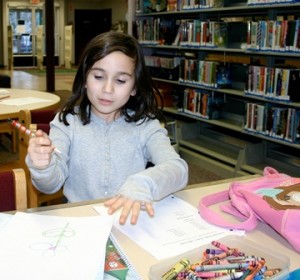
Thank you for your important question! It touches upon the rights of minors, their legal guardians/parents, and how libraries balance children’s privacy with safety and parental responsibilities.
Public and school libraries work hard to protect children while valuing rights to privacy. Although libraries tend to vary to some degree in order to meet the needs of each community, there are child protection laws that directly affect how any government agency works with minors. Libraries and librarians steadfastly adhere to protecting children from abusive Internet sites, for example, and help guide children to appropriate materials for their homework and reading pleasure, as well as to enhance every family member’s lives. After all, children are part of a whole system and libraries are in a unique position to offer enriching programs and materials for each generation’s interests and learning styles.
Generally, parents/guardians assist their children with library card applications and retain responsibility for library materials checked out and resources used. As stated, “Children under the age of 18 must have a parent or guardian present to sign for the card. “ Here is a link to the Delaware Library Card Application that shows this information.
The above link also brings you specific links for each county’s library card applications and the wording for parental responsibility for their minor’s use and access.
The American Library Association offers guidelines that help each library make professional decisions about how to address the privacy concerns of a minor with a parent or guardian who is legally responsible for borrowed library items:
“Parental responsibility is key to a minor’s use of the library. Notifying parents about the library’s privacy and confidentiality policies should be a part of the process of issuing library cards to minors. In some public libraries, the privacy rights of minors may differ slightly from those of adults, often in proportion to the age of the minor. The legitimate concerns for the safety of children in a public place can be addressed without unnecessary invasion of minors’ privacy while using the library.”
I hope this gives you the information you need for your research. Please feel free to to consult with a specific Delaware public library as well. As librarians and community members we are glad to have your questions and patronage.
We appreciate your support and hope to see you in our libraries and online through Ask a Librarian Delaware soon!
Written on: June 19th, 2013 in Archives

Idyllic summer months call to mind sunny days at the beach, hiking in the woods, a picnic in the park, etc.; however, there can be dangers lurking with each summer activity. A new Summer Safety LibGuide offers books and other resources on planning for extreme weather, water safety tips (swimming and boating), insect and poisonous plant protection, and more. Make your 2013 summer safe and fun!
Written on: June 13th, 2013 in Archives
There have been warnings of a derecho from meteorologists in the news lately. But what is a derecho?
According to the National Oceanic and Atmospheric Administration (NOAA), a derecho “is a widespread, long-lived wind storm that is associated with a band of rapidly moving showers or thunderstorms. Although a derecho can produce destruction similar to that of tornadoes, the damage typically is directed in one direction along a relatively straight swath.”
CBS News states “derechos differ to tornadoes in scale. Tornadoes are more isolated events – a single parent storm or a single thunderstorm that hits a certain area. A derecho is a very large weather event that covers a much greater area.”
Here are some resources to prepare for derechos, hurricanes, and other severe storms:
Connect with us:
Written on: May 5th, 2013 in Archives, Q & A's
Q: “Do librarians consider Wikipedia reliable enough for research?”
 What an interesting question! Since Wikipedia’s inception in January, 2001 (See CNN’s 2005 Q & A with Wikipedia founder Jimmy Wales), this online encyclopedia has stimulated on-going discussions about its reliability.
What an interesting question! Since Wikipedia’s inception in January, 2001 (See CNN’s 2005 Q & A with Wikipedia founder Jimmy Wales), this online encyclopedia has stimulated on-going discussions about its reliability.
Wikipedia uses wiki software to create it’s many pages and the ability for users to create accounts and add and edit information. The idea of a community-contributed encyclopedia that is self-regulating has been of interest to many Internet users world-wide; Wikipedia is not the only collaborative resource available for participation and use. Mr. Wales offers further explanation:
“One of the big misconceptions about Wikipedia, people imagine that it‘s something like one million people each adding one sentence each and somehow miraculously it becomes something useful. But in fact what actually makes it work is the community. There‘s a really strong community of people behind the site and they are in constant communication by email and IRC chat rooms and things like this. And so they are monitoring every change that goes to the site – there are people who are looking at it and vetting it and trying to see if it‘s good or not.”
According to Wikipedia’s statistics, on May 5, 2013 for the English version there are 1,444 administrators and a few thousand editors who monitor and make changes to content as appropriate. The software functionally alerts readers of updated and changed information, making it easier to determine when a change has been made. In fact, you can see the revisions yourself: look at the upper right hand corner for “history”. When you click on that, you should see a list of when a change was made, what was made, and by whom. 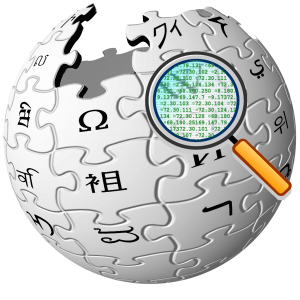
Because Wikipedia’s reliability has been in question while increases in use have driven its popularity, there have been studies comparing this online encyclopedia with a well-known, highly reputable source, the “Encyclopedia Britannica.” For example, “Nature” conducted comparative research on a sampling of science articles and information in 2005 and reported the Britannica Encyclopedia (online version) was a similar source when compared to Wikipedia. As reported on the “Reliability of Wikipedia” —
“Based on their [Nature’s] review, the average Wikipedia article contained 4 errors or omissions; the average Britannica article, 3. Only 4 serious errors were found in Wikipedia, and 4 in Encyclopædia Britannica. The study concluded: “Wikipedia comes close to Britannica in terms of the accuracy of its science entries”, although Wikipedia’s articles were often ‘poorly structured’.”
One result was that the Wikipedia community worked harder to further its waning reputation. (Wikipedia contains an article that might be of interest called: “Errors in the Encyclopedia Britannica that have been corrected in Wikipedia.”) Other studies have been conducted and publicized, giving users more to consider when using it for research and information purposes. The Wikimedia Foundation, which supports Wikipedia, offers “Seven years after Nature, pilot study compares Wikipedia favorably to other encyclopedias in three languages” which was posted by Dario Taraborelli on August 2, 2012. In this article, Taraborelli explains:
“The study compared a sample of English Wikipedia articles to equivalent articles in Encyclopaedia Britannica, Spanish Wikipedia to Enciclonet, and Arabic Wikipedia to Mawsoah and Arab Encyclopaedia. 22 articles in the sample were blind-assessed by 2 to 3 native speaking academic experts each, both quantitatively and qualitatively.”
The results?
“… Wikipedia articles in this sample scored higher altogether in each of the three languages, and fared particularly well in categories of accuracy and references. As the report notes, the English Wikipedia fared well in this sample against Encyclopaedia Britannica in terms of accuracy, references and overall judgement, with little differences between the two on style and overall quality score.”
So does this mean Wikipedia is a reliable source of information? And how do librarians use Wikipedia?
Librarians have training in the evaluation of web (and other types of) resources. In simple terms, we’re taught to look for authority, authorship, accuracy, credibility, currency, and objectivity. Cornell University’s Libraries offer an in depth guide to criteria and tools for web evaluation that you might find useful when scouting for reliable sources of information online. Because Wikipedia is easily edited, it’s not considered reliable. But it is commonly used and can be useful as a starting place for research, especially for finding the sources that are cited in each article. In summary, here are some tips:
It’s a useful tool, but caution is the key word! Schools and academic libraries, businesses, organizations and public libraries all need the strength of unbiased, current sources and to find ways to work with the growing popularity of Wikipedia and other online tools.
Thank you again for your question! If you need further information or have questions in the future, please feel free to ask your Delaware librarians online and in person. We’re glad to help, anytime!
Written on: April 29th, 2013 in Archives, Q & A's
Q: “I have black birds that build a nest in the same spot on my garage every spring. I’ve tried using fake owls, moving their nest before they lay eggs, even making noise. I don’t want to resort to anything that will harm them but it destroys the corner and is very messy. How do I keep these birds from doing this every year?”
Early spring is the time for a variety of birds in our Delmarva region to find prime real estate for their nests. As you indicate, some birds migrate and return to the same location used for their hatching location. It’s incredible how accurately they find the exact spot their parents used after months of travel.
You indicated that you’ve tried some commonly-used methods for discouraging nesting, such as with a predator (owl) statue. There may be some other ideas that can help. For example, a Conservation site from Polk County, Iowa suggests installing some type of plastic sheeting or netting as a barrier to prevent barn swallows from re-nesting. As they state:
“Swallows have a strong attachment to their nest site. If you remove the nest, they will try to rebuild in the same location. If you move the nest even a short distance, the bird may abandon the nest and anything in it. In general, from the time the bird begins sitting on its eggs until the young are ready to leave the nest, four weeks will pass. If you can afford to wait, that’s the best choice for the birds. Plus it is illegal to disturb the nests of birds protected under the federal Migratory Bird Treaty Act.”
The Cornell Lab of Ornithology gives the idea of posting multiple deterrents, not just one. For example, use a statue of an owl and another predator, and play recordings of birds in distress. This combination may deter even the most stubborn starling. Another example of this process was used by Vanderbilt University for its stadium, which was having problems with starlings.
Recordings of birds can be found online, too, such as through Cornell University. Cornell’s Ornithology site offers hawk sounds and other vocalizations from predators, too, and can help you identify the type of bird that is choosing your home for its nesting site.
It may also be helpful to find bird songs from predators and those in distress online through YouTube and other commonly-used sources, and set up a way to play this periodically to chase away any notion that your garage or location is a good nesting area.
Another site, from the Migratory Bird Center, gives information about the differences of birds within each species and uses wrens as an example. Sometimes it’s helpful to understand more about how birds behave in order to safely and humanely solve such a problem.
Our Delaware Libraries have books about identifying and understanding birds in our region, including “The Everything Bird Book; from identification to bird care, everything you need to know about our feathered friends” by Tershia D’Elgin.
Another helpful book is “The Field Guide to Backyard Birds of the Northeast,” published by Cool Springs Press (2008).
It’s a little too late to move the nest now, but with these guides you’ll be all set for next year. Depending upon the warmth of the late winter, we can see swallows migrating back to our region in early March. Two excellent online guides can help us learn more about these migrations and in this way, help prepare for next year’s guests:
1. Audubon Society of North American has extensive information about birds, their behaviors and migrations.
2. A basic but informative Teacher’s Resource from Carolyn Sedgwick of Cornell University gives highlights about bird migration and resources for further exploring.
Thank you again for your excellent question and good luck with your bird situation; let us know if we can help further. We appreciate your service, and your support of our libraries and please feel free to contact us again anytime you have questions or need information, in person and online. Happy birding!
Written on: April 22nd, 2013 in Archives, Q & A's
Q: “I have a paper to write about how Earth Day started. Can you give me some resources to help?”
Happy Earth Day! It is celebrated every April 22!

Earth Day has evolved a bit over the years. According to the Earth Day Network, April 22nd “marks the anniversary of what many consider the birth of the modern environmental movement in 1970.” It began as a way to focus upon and learn about the environment around us and our impact, and to work on ways to help sustain and nurture our planet. As mentioned on History.com, Earth Day is now celebrated around the world.
It also marks the beginning of the U.S. Environmental Protection Agency. In the spring of 1970, Senator Gaylord Nelson (Wisconsin) saw the establishment of April 22 as Earth Day as a way to force this issue onto the national agenda, largely because of his efforts and the millions of Americans who raised their voices in support. As recounted on the EPA’s site, “In December 1970, Congress authorized the creation of a new federal agency to tackle environmental issues, the U.S. Environmental Protection Agency.” The Clean Air Act and Clean Water Act soon followed.
Senator Nelson’s description about how Earth Day came about is found on EnvironLink. There is also a website called “Gaylord Nelson and Earth Day” dedicated to Senator Nelson’s vision and work, which includes background leading up to Earth Day as an internally-recognized day to promote environmental awareness. Earth-Sky Science News offers another view, answering the question “Why is Earth Day celebrated on April 22?”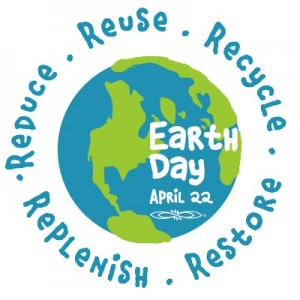
You might enjoy the NBC’s Special Correspondent Tom Brokaw created a visual summary history about Earth Day, which is freely available on Hulu (an online video sharing site). Mr. Brokaw highlights Senator Nelson’s move toward an Earth Day during a period of time in U.S. history when pollution was beginning to have devastating effects on nature. Further statistics and facts can be found on InfoPlease including a list of biographies of others who were instrumental in this movement, such as Rachel Carson (who wrote “Silent Spring” which is “generally acknowledged as the impetus for the modern environmental movement”).
The Delaware Library Catalog has a vast array of library items from books to DVDs about Earth Day, for all ages. These include histories, biographies, and things you can do. If you have questions about events or need more information about environmentalism, going green, and topics related to Earth Day, please feel free to drop by our libraries or chat with us online. We love your service and support of our libraries!
Written on: April 14th, 2013 in Archives, Q & A's

Q: “I’m going to host a fancy party this weekend and realized I don’t know much about wine and cheese pairings other than I really like to drink wine and eat cheese. Do you have any books or resources that can tell me about wine and cheese pairings? Thank you!”
There are several resources that discuss the flavors and pairings of wines with particular cheeses. Let’s start with some reputable magazine articles that are freely available online.
Wine Enthusiast Magazine (and online catalog) offers expert opinions from editors and wine-tasters from around the globe. The “meet the editors” page gives information about who is involved in the companies’ articles and advice.
Here is a direct link to Wine Enthusiast Magazine’s article about pairing cheeses with wines.
This article includes a table listing cheeses by name, and recommendations for which wine to serve. They also give a brief summary of cheese and some helpful tips for creating a wine and cheese party.
Better Homes and Gardens’ article offers photographs of each cheese selection they highlight. As stated on their introduction, “This guide offers tasty matches that fit naturally with your entertaining plans.”
A fantastic resource is through our Delaware Libraries – our magazine databases. These are freely available through your library account. Here’s a simple way to find articles on wine and cheese pairings for a party:
When I processed this search I came up with 23 items; some offer party planning tips, give listings of cheeses that go with certain wines, and other pertinent considerations. You can also save and print articles to take to the store with you!
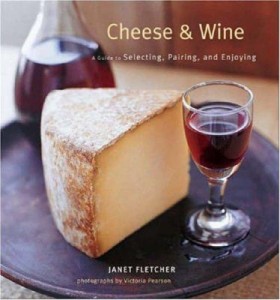 If you would like to find a book on the topic, there are a few that specifically address wine and cheese pairings. Here are the top two:
If you would like to find a book on the topic, there are a few that specifically address wine and cheese pairings. Here are the top two:
1. Cheese & wine book : a guide to selecting, pairing, and enjoying by Janet Kessel Fletcher (2007).
2. The all American cheese and wine book : pairings, profiles & recipes by Laura Werlin (2003).
These and more are found through our Delaware Library Catalog. Simply put in “cheese and wine pairings” (without the quotes) as a starting place for your search. Many other books and resources came up in the results list. You can place a hold on items and have them sent to the library that is most convenient for you.
We hope this completely answers your question; please feel free to ask us anytime, in person and online. We truly appreciate your service and support of our Delaware libraries and we hope you have a great party!
Written on: March 24th, 2013 in Archives, Q & A's
Q: “I checked out a book about 3 years ago and would like to recommend it to someone. Does the library keep record of books that have been checked out on my card #?”
It’s great to have a record of what you’ve checked out from your Delaware library to read, listen to and watch. Over time, it’s sometimes hard to remember titles and authors, but perhaps the story had a lingering, important significance for you and you’d like to find it again.
Because libraries value patron privacy they do not keep records of items that have been returned (and which have no fines or fees attached); this clears them off your record. Ebooks and eAudiobooks automatically expire from our patrons’ accounts on their due dates, too. 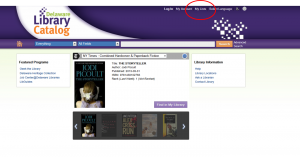 To keep a history of items, you have a couple of good options: using your own library account on the Delaware Library Catalog and through Goodreads, “a ‘social cataloging’ website founded in December 2006 and launched in January 2007 by Otis Chandler, a software engineer and entrepreneur and Elizabeth Chandler” (Wikipedia on Goodreads, retrieved March 2013).
To keep a history of items, you have a couple of good options: using your own library account on the Delaware Library Catalog and through Goodreads, “a ‘social cataloging’ website founded in December 2006 and launched in January 2007 by Otis Chandler, a software engineer and entrepreneur and Elizabeth Chandler” (Wikipedia on Goodreads, retrieved March 2013).
I’ll explain the steps in the new Delaware Library Catalog since we have previous postings to help with the older version. If you have created and saved lists on the older catalog, you may also transfer these to the new one, but it’s worth noting that this is allowed only once so you’ll need to maintain your new list on the new catalog (you can’t transfer or ‘sync’ lists repeatedly).
To create a list that you can use from this point on, go to the new catalog’s “My Lists” feature linked in the upper right corner of the Delaware Library Catalog home page. When you click on that, you’ll be prompted to log in using your 14-digit library card number and PIN – that will be on the left hand side of your screen. (Alternatively, you can log in prior to clicking on “My Lists.”)
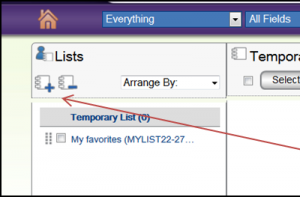 To add new lists simply click your mouse on the “+” that is next to an image of a spiral notebook. Name the list and you’re ready to use it. If you have more than one list, make sure to activate the one you want to work with.
To add new lists simply click your mouse on the “+” that is next to an image of a spiral notebook. Name the list and you’re ready to use it. If you have more than one list, make sure to activate the one you want to work with.
To delete any unwanted lists, you can check the box next to the one you’re ready to delete and press the “-” that is next to the image of the spiral notebook.
The Delaware Library Catalog has a handy guide providing further details and screenshots to help walk you through creating and working with “My Lists” on their “New Catalog help” page. You may consider making different lists for your varied tastes, such as “Cookbooks”, “Mysteries” and “Favorite Movies.” Adding titles to these is as easy as clicking and naming each list.
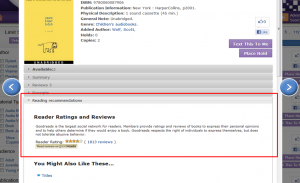 Goodreads is a free, external site that is also a way to keep track of items you’ve read, watched and listened to, but in a way that is social. You and your friends can rate titles, provide summaries, and recommend books on this sharing network. In fact, when you are looking for titles on the Delaware Library Catalog, you can also see Recommendations – and many of these are linked through Goodreads. The screen shot on the right shows a view of “Reading Recommendations” with over 1800 Goodreads’ Reader Ratings and Reviews for the book, ‘Love that Dog’ (as of March, 2013).
Goodreads is a free, external site that is also a way to keep track of items you’ve read, watched and listened to, but in a way that is social. You and your friends can rate titles, provide summaries, and recommend books on this sharing network. In fact, when you are looking for titles on the Delaware Library Catalog, you can also see Recommendations – and many of these are linked through Goodreads. The screen shot on the right shows a view of “Reading Recommendations” with over 1800 Goodreads’ Reader Ratings and Reviews for the book, ‘Love that Dog’ (as of March, 2013).
We hope this provides you with what you need to create lists that you can keep for years to come. It’s fun to see our personal lists grow throughout time and be reminded of the stories we’ve experienced and that have touched us, and, as you have noted, to be able to refer specifically to something that we’d like to recommend to others.
Please feel free to contact us anytime you have questions in person and online through our Ask a Librarian Delaware service. We truly appreciate your support and use of our Delaware libraries!
Written on: March 17th, 2013 in Archives, Q & A's
Q: “I can’t afford an accountant and heard that there might be some free or low-cost tax preparation help. Is this through the library? Can you tell what I need to do to get help?”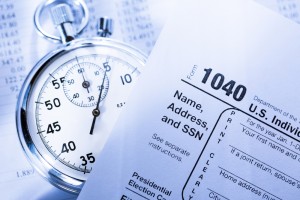
Federal and state income taxes are coming due. This year, it’s on Monday, April 15.
USA.gov has annual filing dates listed on their helpful site, and includes information about who should file, when and how. This is also a great starting place for finding details about tax preparation assistance programs, such as those commonly offered through the public libraries in Delaware. Generally, most tax preparation assistance is offered from the end of January/beginning of February through April 15 each year. Let’s start with an overall view and narrow it down to our local Delaware Library level.
The U.S. Internal Revenue Service provides information about free tax preparation assistance programs. You can also see information about these programs by state on USA.gov’s site. They are provided through two programs: the IRS Volunteer Income Tax Assistance (VITA) and the Tax Counseling for the Elderly (TCE) Programs. Assistance is given to those who qualify based upon income and, for the TCE Program, by age. “[P]riority assistance [is given] to people who are 60 years of age and older, specializing in questions about pensions and retirement issues unique to seniors.”
Well-known non-profit organizations have expert volunteers who assist the VITA and TCE Programs to provide free tax help in as many locations aws possible, such as the American Association of Retired Persons (AARP), who works with the TCE Program. Here is AARP’s page for locating their free tax prep services by county in Delaware and what you need to know in order to qualify, as well as what to bring with you when you go to your appointment (look about halfway down the page).
Most of Delaware’s libraries provide online information about these tax prep programs, such as through New Castle County public libraries’ and Sussex County public libraries’ sites. Another calendar, provided through Dover Public Library’s site, allows you to search for the topic you are interested in. If you put in “tax” in the keyword search (upper left side) and press ‘enter’, you can see that there are regularly-scheduled tax assistance programs offered. Note that you must make an appointment for many of these tax preparation assistance programs.
You may be interested in knowing that you might qualify for free software to assist you in preparing your tax returns online. The IRS has provided a listing of “Free File Software” for those whose adjusted gross incomes are $57,000 or less. They also have their tax forms linked on this page for easy access.
The State of Delaware’s Department of Revenue also has online information about free tax filing software for those who qualify. Each listed software is annotated with the income level requirements right on this page.
Just so you know, the Federal government started accepting most types of tax returns as of January 30 this year. If you anticipate a return on your taxes, this may be good news.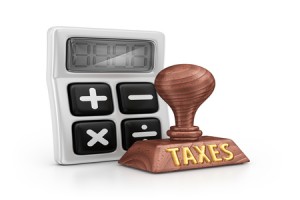
It’s also interesting to note that more than 80% of tax payers filed electronically in 2012 and in light of online access and filing, it’s important to keep yourself protected. USA.gov offers good advice about being aware of potential scammers. See the bottom of this webpage for Scams and Fraud information.
Although librarians are not tax accountants or advisors, we can certainly help you find the information you need to get help with taxes, and we’re glad to! Please feel free to ask us in person at your Delaware public library or online through our live chat service, Ask a Librarian Delaware, anytime! Thank you for your question!